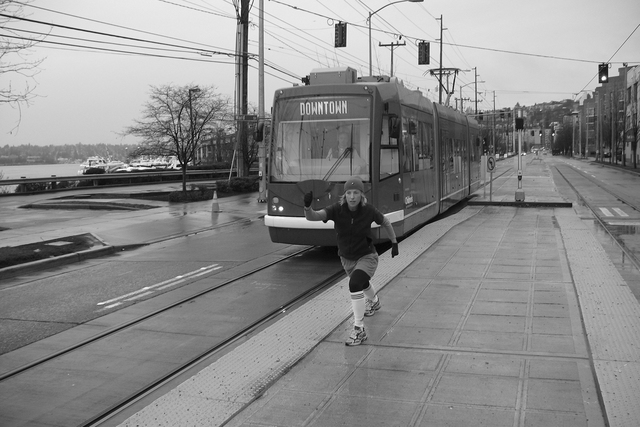It took Ronny Bell all of about 12 sweat-soaked hours on an organic Wisconsin farm to discover that a life filled with overalls and tractors wasn’t for him.
“There were mosquitoes all over me, and I quickly realized I’m not one to till the land,” says Bell, a native New Yorker who attended the University of Wisconsin. “But I looked over at the harvested crops and said, ‘I know how to sell that.'”
Hawking chow is in Bell’s blood. His granddad, Leonard Pines, ran the kosher food company Hebrew National and, in so doing, took an icon of potbellied gluttony—the hot dog—and made it seem healthy.
By the time Bell was ready to flee the Badger State, organic was the new kosher. After working briefly for the short-lived Post Alley health-food eatery Sun Spot, Bell opened Pioneer Organics in industrial Ballard in 1997 with six customers, two home-delivery vans, and a bushel of seasonal goods from local farmers and culinary entrepreneurs. Having weathered the storm that HomeGrocer.com couldn’t, Pioneer now has over 6,000 clients, has expanded to Portland, and runs three of its dozen delivery vehicles on biodiesel fuel purchased a block north at Dr. Dan’s Alternative Fuelwerks on Northwest 50th Street.
Located between Bell’s space and Dr. Dan’s in a low-slung building at Northwest 49th Street and Ninth Avenue Northwest is a green-office-products company called Sustainable Group, thereby cementing a formidable little biodegradable belt that counts the Ballard Avenue farmers market, Walt’s Organic Fertilizer, Cafe Humana, and the vegetarian Patty Pan Grill among its health-conscious brethren.
This back-to-the-earth nexus has the traditionally blue-collar enclave damn near out-hippying neighboring Fremont, and it provided Vic Opperman with a strong foundation from which to ratchet up Sustainable Ballard. The recently incorporated nonprofit is designed to steer the neighborhood toward community self-reliance and autonomy in an effort to cut down on shipping (and, in turn, energy costs) and prop up local growers who shun genetically modified food processes and additives.
“With the war in Iraq being about oil, the cost of transporting goods will continue to go up,” says Opperman, a residential designer who helped form Sustainable Ballard after she grew tired of participating in war protests. “So how to conserve energy is pretty much the basis for Sustainable Ballard.”
At the fore of Sustainable Ballard’s tactics is its push to get Ballardites to eat locally, an effort that will be highlighted at a March 30 banquet at the Oddfellows Hall where patrons will feast on a menu put together by chefs and merchants in and around Ballard. Patty Pan’s Devra Gartenstein will prepare a salmon dish, the Fresh Fish Market will provide sashimi-grade tuna, Stumbling Goat Bistro (in nearby Phinney Ridge) will contribute a second seafood preparation, and soup will come from the U District’s raw foodists at Chaco Canyon Catering Company. Other contributions and courses are still being finalized.
Judy Kirkhuff, who oversees the neighborhood’s Sunday farmers market, is a true believer in a nationally replicated model called the 100 Mile Diet, whereby consumers are challenged to subsist on foodstuffs grown within a 100-mile radius of their homes. At a recent Sustainable Ballard Food Committee meeting, Kirkhuff was confronted with the reality that a local specialty shop that had signed on to provide cheese for the March 30 banquet had backed out due to low winter yield.
“Let’s remember that we’re teaching people how to be seasonal,” said Kirkhuff. The group’s subsequent verdict: No cheese, no problem.
Herein lurks sustainability’s primary stumbling block: For the movement to become more than a well-intentioned undercurrent, the machinations of whatever-you-want, whenever-you-want-it mass consumerism must make a hairpin turn.
“The big problem with [the 100-mile] standard is being able to reliably get the things you want from that radius,” says Seattle University economics professor Gareth Green. “If consumers were willing to not have certain things in the name of sustainability, then you’d be OK.”
But even hyperconscious suppliers like Pioneer Organics aren’t there yet.
“We try to buy as much local produce as possible,” says Bell. “But, this time of year, I have to buy a lot from California. If I didn’t, I wouldn’t have a business.”
There has, however, been a recent heightening in consumer awareness of regionally produced goods, says consumer analyst Laurie Demeritt of the Bellevue-based Hartmann Group, which leads her to believe that “local” is beginning to nudge out “organic” for prime shelf position in the foodie lexicon.
“Organic is pretty mainstream,” says Demeritt. “But in some cases, we’re finding that people are more concerned where the food is coming from than whether it’s organic or not.”
Consider Bell and his Ballard neighbors to be among these converts.
“These farmers are all sort of struggling to make it,” says Bell. “So we’re willing to make concessions on the organic standard if we find out their food is local, pure, and sustainable.”








